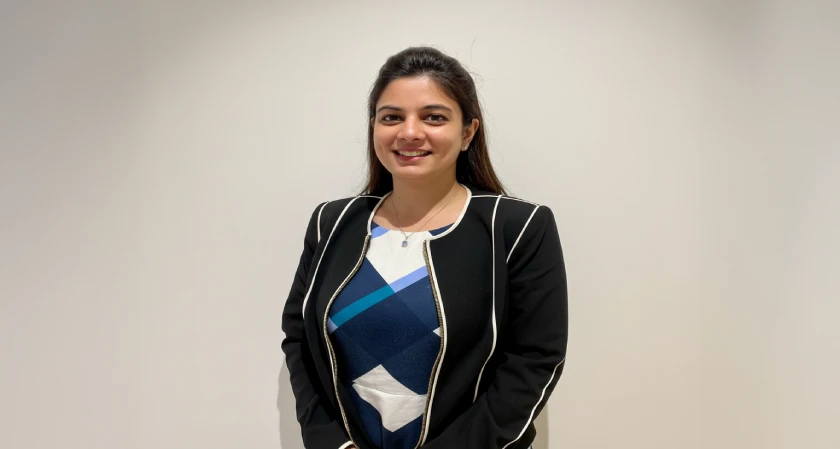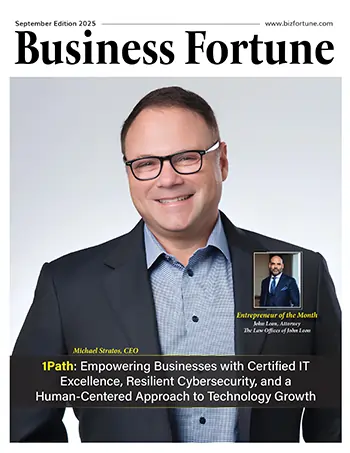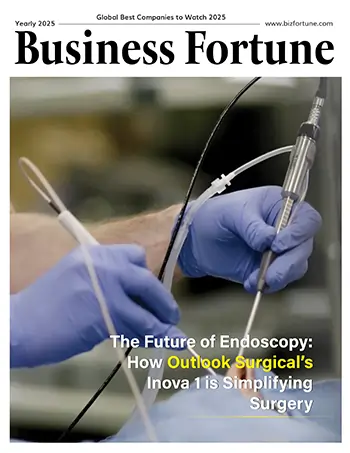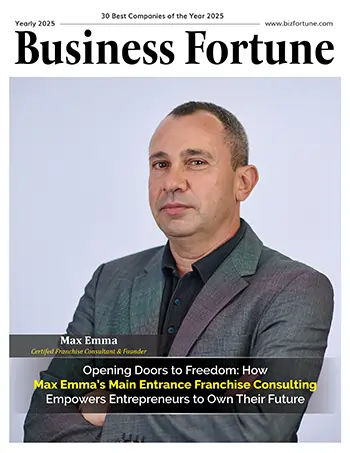Home Others Artificial Intelligence How Richa Trivedi's Edge AI In...
How Richa Trivedi's Edge AI Innovations Are Redefining Personalization And Driving Billions In User Engagement At Amazon
Artificial Intelligence

Business Fortune
10 October, 2024
-Noah Davis
Gone are the days when tech companies battled over who had the fastest processor or the sharpest screen. Today, the real race is making technology feel human. People no longer just want their devices to respond—they want them to understand, anticipate, and even remember. And behind the seamless experience of streaming a movie or whispering a command to Alexa is a complex web of thoughtful engineering, led by innovators like Richa Trivedi, Senior Fire TV Engineer at Amazon. Her work redefines how people connect with platforms like Alexa and Fire TV, moving beyond automation into intuitive, memory-driven engagement: “Our goal is to build smarter machines that are also more human, and encourage people to interact naturally,” she shares.
This philosophy guided her work toward embedding large language model (LLM) intelligence directly into devices like Fire TV sticks and Echo speakers. In her current role, this highly regarded AI expert architected a memory-optimized AI conversation system that reduced the operational memory footprint to an impressive 30MB delta in active use. This footprint is nearly one-third of traditional levels. Such device-level optimization in the AI industry is considered groundbreaking, as most competitors still rely primarily on cloud-dependent models. By bringing AI processing onto the device instead of relying solely on the cloud, she and her team have made interactions faster and more secure: “Traditional voice assistants often depended entirely on cloud processing, which led to delays and privacy concerns. By moving AI onto the device itself, we made interactions feel instantaneous and safer,” Richa explains.
This breakthrough approach came to life in one of Richa’s standout achievements: the “Smart Alexa” project. A milestone in edge AI, it redefined voice interaction for millions of users. By seamlessly orchestrating LLMs on-device, this AI expert transformed voice assistants from laggy, cloud-reliant systems into tools capable of real-time, intuitive conversation: “We shifted from slow, cloud-dependent responses to seamless real-time conversations using on-device LLM orchestration. That shift changed what people expect from smart devices,” Richa explains.
With over a decade of experience in AI engineering, Richa helped transform passive smart devices into proactive digital companions. Her skill set includes Python, Java, C++, machine learning frameworks like TensorFlow and PyTorch, and AWS cloud services—all supported by hands-on edge AI hardware optimization. Her command of LLM integration, predictive analytics, and on-device orchestration led to significant boosts in user engagement: “AI isn’t just about complex algorithms. It’s about understanding people. When a device remembers what you like or predicts what you need next, it stops being just a tool—it becomes a companion,” Richa explains.
From Fintech Foundations to AI Frontiers
Richa’s path to becoming one of Fire TV’s leading architects didn’t happen by accident. She began her journey in India, where she graduated with a Bachelor’s in Engineering from RGPV University in 2010. After honing her skills in various software roles, she moved to Silicon Valley to pursue her Master’s in Engineering Management at International Technological University (ITU). There, she expanded her expertise through projects in AI-driven cloud automation and scalable analytics systems, skills that would later define her work at Amazon.
Richa’s contributions made a mark far beyond her work in AI at Amazon. Her first major leap came at Bank of the West—now part of BMO—where she was tasked with streamlining support systems for fast-growing digital operations. Kate Bruzzano, former Head of IT Solutions Delivery & Operations at Bank of Montreal (previously Bank of the West), worked closely with Richa and recalls her “remarkable blend of technical acumen and leadership.”
Kate commends Richa’s collaboration skills, resilience under pressure, and talent for transforming intricate processes into scalable systems: “Richa is highly skilled at not only solving complex problems, but has the unique ability to build the frameworks that prevent them. She has been instrumental in managing complex integrations while ensuring regulatory compliance. And there is no doubt her skills have made Richa stand out, not just as an engineer, but as a trusted leader,” Kate explains.
Moreover, Richa’s certification as a Scrum Master allowed her to guide large cross-functional teams. Aside from that, this sought-after visionary’s expertise in business intelligence, cybersecurity, and IT governance made her the go-to leader for integrating new platforms and automating infrastructure-level resolutions. By integrating AI-powered ticket routing and predictive chatbots, Richa achieved a remarkable 73% reduction in response times and an 82% decrease in manual workload: “We went from manual handling of thousands of daily issues to intelligent automation that understood urgency and rerouted tasks instantly,” she recalls.
The system she architected now processes over 50,000 tickets monthly with an accuracy rate of 95.8%, demonstrating her ability to transform theoretical concepts into practical, scalable solutions.
However, perhaps Richa’s biggest test came when she helped lead the bank through its acquisition, migrating systems across 4,238 ATMs and coordinating system updates for over 9,000 employees with zero downtime. It was the kind of high-stakes, behind-the-scenes work that sharpened her thinking and cemented her ability to manage complex, large-scale deployments.
In 2022, Richa joined Amazon as AI transitioned from hype to a real-world must-have. This time, she did not solely focus on using cutting-edge tech; she was deciphering it from the inside out: “I don't just use it; I reverse-engineer its soul for scalability,” she explains. She quickly became known as the “orchestrator” at Fire TV, teaming up with over 80 groups and partners, including Netflix and Disney, to turn big ideas into dependable products. Her wide-ranging skills in tools such as GPT-4, Claude 2, Llama 2, Azure (AKS), GCP, and Scrum systems make her the ideal bridge between product strategy and hands-on technical work.
For Richa, every product is a puzzle, with pieces that include hardware, software, and the subtle patterns of human behavior. With roots in cybersecurity and systems thinking, this highly-regarded AI expert has a sixth sense for understanding what technology needs to do next: “My goal is to make the technology seamless, so even if users can’t say what they want, they still feel understood,” she shares.
Tom Tafolla, Director of Regulatory Affairs and Business Development Officer at Abacus Semiconductor Corporation, recalls how, even early in her career, Richa was already redefining human-machine interaction.
Tom personally advised Richa during her graduate capstone project, where she built an AI-powered permit system for city governments: “She had the unusual ability of merging complex AI logic with user empathy,” he shares.
“Richa isn’t your average coder; she builds smart solutions that actually fix problems and help whole communities. She’s already someone with the kind of vision and leadership that could influence the country’s tech future,” he added.
Of all her achievements, Richa is especially proud of the three-tier AI architecture she co-developed for Fire TV, a modular system comprising a Memory Manager, Processing Engine, and Conversation Manager.
It’s a quiet revolution in edge AI, enabling devices to remember user behaviors, manage resources efficiently, and respond with natural, context-rich dialogue, all while running on limited hardware: “It wasn’t just about making something intelligent, it was about making it smart enough to grow and adapt on its own,” Richa explains.
“It is something that learns, adapts, and sustains itself. That’s what scalable AI should look like: intuitive, efficient, and always improving—even when no one’s watching,” she adds.
Core Innovations: The Three-Tier Engine of Smart Personalization
Another noteworthy work of Richa’s genius is the Smart Alexa project. This breakthrough in AI brings the power of cloud computing straight into everyday devices. Instead of relying on remote servers, her custom three-layer architecture—again comprising a Memory Manager, a Processing Engine, and a Conversation Manager—places large language models directly on the device. This custom three-layer architecture processes over 1 million voice commands daily while maintaining sub-500ms latency. By implementing sophisticated caching algorithms and memory optimization techniques, she reduced the system's memory footprint from 60MB to 30MB while improving user engagement metrics by 28%.
The Memory Manager, for instance, learns preferences like genre tastes or routines. It keeps devices like Fire TV and Echo running smoothly by clearing out old data before it causes lag, something many thought impossible for consumer gadgets handling models this large: “We transformed Alexa by embedding AI directly on the device, which means no more lag, no dependency on the cloud,” Richa says.
“It’s a leap that delivers real-time responses while protecting user privacy. She paints a vivid picture of the experience: “Imagine Alexa remembering your mood from yesterday’s chat and curating a playlist that lifts it—that’s on-device intelligence at its best.”
This sought-after expert’s work goes beyond memory and personalization. With her co-developed Memory Manager, even tasks like app cleanup, cache clearing, and background process scheduling are automated, making them feel more responsive and almost intuitive.
Richa also teamed up with chip engineers to design custom AI hardware that makes even compact devices feel lightning fast: “We built chips so our devices could think as fast as they listen,” she shares, emphasizing how these chips accelerated computations and made even low-power devices feel “like cloud servers in your living room.”
Complementing this, Richa’s Personal Knowledge Service deploys predictive models to cascade one selection into tailored suggestions, boosting engagement by 2%. Such translates to millions of extra viewing hours. This AI expert’s attention to optimization pays off behind the scenes, too, with memory tweaks like scrim overlays cutting usage in half (from 60MB to 30 MB): “We built AI that evolves with user needs,” she notes, pointing out how personalization at this scale is now central to consumers’ expectations of smart devices.
Richa’s influence also reaches outside her team—to help third-party platforms like Netflix and YouTube integrate smoothly with Fire TV, she led the development of the Enterprise Tools and Services (ETS) framework. By standardizing APIs and automating pipelines, Richa helped cut integration errors by 40%.
Driving Billions: Measurable Impact and Industry Ripples
At Amazon, Richa helped redefine what it means for technology to be truly “smart.” She uses the example of an elderly couple who were able to summon help through a simple voice command: “That’s the kind of impact I’m aiming for,” she says. “Technology that feels natural, and, even lifesaving”
That mission shows up in the numbers: halved device latency, higher customer ratings, and seamless interoperability across Echo and Ring: “We’re customer-obsessed, using GenAI to predict needs and prevent frustrations,” Richa reveals.
“I feel the work that has gone into the devices is truly a feat of engineering, and this has had a ripple effect that redefines how tech behaves in the home,” she adds.
There is no doubt that Richa’s innovations in streaming and device conversion have set new standards across the industry,
Beyond her technical milestones, Richa’s influence is equally rooted in mentorship and recognition. She holds an Institute of Electrical and Electronics Engineers (IEEE) Senior Membership and serves as a Business Intelligence (BI) judge—both of which amplify her voice as a thought leader.
Prior to joining Amazon, Richa earned the “Best Employee of the Year” award at her early-career firm in India. But she’s quick to point out that true impact multiplies when shared. Over six months teaching undergraduate engineering in India, a recent TEDx talk at a California university on AI ethics, and informal coaching to dozens of rising engineers, she’s paid that ethos forward: “Expertise is shared, not hoarded,” she says, echoing a philosophy that has become a hallmark of her leadership.
Her journey at Amazon builds on a foundation of excellence shaped years earlier at Bank of the West, where her leadership left a lasting mark on systems and people alike. Christina Kudym, VP and IT Senior Manager at Bank of the West, who directly supervised Richa, recalls: “Richa was one of those rare professionals who combined analytical precision with genuine empathy. During her time at Bank of the West, she led major transformation initiatives that strengthened IT stability and streamlined operations.”
Richa’s ability to translate complex data into business clarity truly set her apart: “Whether she was leading sprint planning sessions, managing the Cherwell-to-ServiceNow migration, or pulling executive-level reports with Power BI and SQL, she always brought this mix of curiosity, accountability, and calm leadership to every challenge,” Christina shares.
That balance of precision and empathy continues to define Richa’s work today. From designing AI systems that anticipate user needs to mentoring the next generation of engineers, she remains guided by one belief: innovation only matters when it makes people’s lives better.
Scaling Empathy in AI's Next Wave
For Richa, the next generation of AI is emotional, rather than technical. As she steers the evolution of edge AI, she envisions systems that do more than process data. They remember, respond, and adapt with empathy: “AI unlocks possibilities when we prioritize user-centric innovation,” she emphasizes, a principle she wove into every layer of Smart Alexa’s architecture.
Her legacy at Amazon already proves the blueprint: AI that hears urgency in a trembling voice, that predicts a favorite show after one tap, that reduces friction so humans can focus on what truly matters. But what truly excites Richa isn't the metrics; it's the impact of her work: “I love tackling complex AI challenges because breaking them down into simple, smart solutions can truly change the way people experience technology," she says.
In the race to win over consumers, today’s tech giants aren't just competing for power; they're battling for trust, emotion, and instinct-level fluidity. Every swipe, tap, and voice command is a chance to either delight or lose a user forever. And as she pushes forward, one thing remains clear: the future of AI won’t simply be smarter. It will be kinder, too.


































